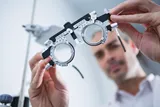Tips en adviezen
1. Gebruik altijd uw beide handen om de bril op of af te zetten.
2. Let er bij het schoonmaken van het montuur goed op dat de
glazen niet beschadigen. Leg uw bril nooit op de glazen neer,
want bij het verschuiven van uw bril kunnen krassen ontstaan.
3. Moderne monturen zijn van sterke materialen gemaakt. Toch
zijn ze vaak kwetsbaar. Een montuur is immers zo licht mogelijk
gemaakt om u maximaal comfort te bieden. Gebruik
daarom een goed passend, stevig briletui. Dit biedt de beste
bescherming.
4. Het is altijd verstandig om de bril bij de glazen vast te houden
en niet bij de veren. Bij het reinigen van het glas dient u eerst
de harde stofdeeltjes, die krassen kunnen veroorzaken, van
de bril te spoelen door deze onder stromend, handwarm
water te houden. Het montuur kunt u vervolgens reinigen
met lauwwarm water, eventueel met een zachte zeep (zonder
citroenzuur).
5. Droog uw bril met een schone zachte doek af. Het beste
kunt u daarvoor een zachte doek gebruiken die zonder
wasverzachter is gewassen. Wasverzachters kunnen namelijk
een wazige zweem op uw glazen achterlaten.
6. Papieren zakdoekjes, keukenrol en papieren brillendoekjes
zijn taboe! Deze bevatten vaak houtvezels die uw glazen
blijvend kunnen beschadigen.
7. Agressieve stoffen kunnen uw brillenglazen ook blijvend beschadigen.
Voorkom daarom contact met aceton, parfum, haarspray,
huishoudelijke schoonmaakmiddelen, citroenzuur enz.
8. Leg uw bril niet op of in het dashbord van uw auto en stel de
bril niet bloot aan hoge temperaturen of grote temperatuurverschillen
(sauna).
9. Wanneer u de bril ergens tegenaan gestoten hebt, kan het
zijn dat deze niet helemaal lekker zit. De bril moet dan worden
bijgesteld. U kunt dit beter niet zelf doen, maar kom gerust
langs in onze winkel, zodat wij de pasvorm met de juiste
instrumenten weer kunnen herstellen.
10. Wij streven naar optimale tevredenheid. Is er iets niet naar
tevredenheid of verwachting, vertel het ons dan alstublieft.
Wij kunnen dan samen naar een oplossing zoeken.

